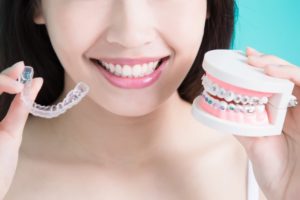Who Is a Good Candidate for Invisalign vs. Traditional Braces?
While Invisalign might seem like the ideal situation for most people, the treatment is unfortunately not designed for everyone. There are a few considerations you must take into account before settling on a method of straightening your teeth, such as:
Orthodontic Issues
Invisalign clear aligners can treat most orthodontic problems, like:
- Fix overcrowded teeth
- Even out gapped teeth
- Align generally crooked teeth
- Correct an open bite by bringing the top and bottom teeth together
- Fix jaws affected by crossbite, underbite, or overbite
For more complex situations, your dentist might recommend traditional braces instead. You may also have to undergo metal braces if you have any existing restorations, like veneers, crowns, or bridges.
Lifestyle and Age
The effectiveness of Invisalign depends almost entirely on the patient’s ability to comply with treatment. You need to be able and willing to wear your aligners for at least 22 hours a day. While it’s perfectly fine to remove your aligners for meals and for the occasional special event (like a wedding or job interview), treatment won’t work as planned if the aligners aren’t kept in long enough. For this reason, teenagers and young adults are usually better candidates for traditional braces.
How Do Braces Work?
Metal brackets are attached to each tooth, with an archwire running through them to shift the teeth into the desired position. The appliance must be tightened in the office every four to six weeks.
How Does Invisalign Work?
Each set of clear aligners, which is designed to move a small portion of your smile at a time, is worn for a few weeks at a time. You’ll still need to see your dentist throughout treatment, but not nearly as often as for braces.
Which Is Right for You?
Ultimately, only your dentist can answer this question. Invisalign offers the most obvious benefits – like being discreet and not restricting your diet – but you’ll have to have your dentist examine your mouth to give you a definite answer. Every case is different, and your dentist will determine which option is the best to straighten your unique smile.
About the Author
Dr. Sara Saremi graduated summa cum laude from Boston University Goldman School of Dental Medicine. She has also earned several additional certifications, including Invisalign in Mid Cities. She currently holds a membership with the American Dental Association. To schedule a consultation for Invisalign,
visit Dr. Saremi’s website.


